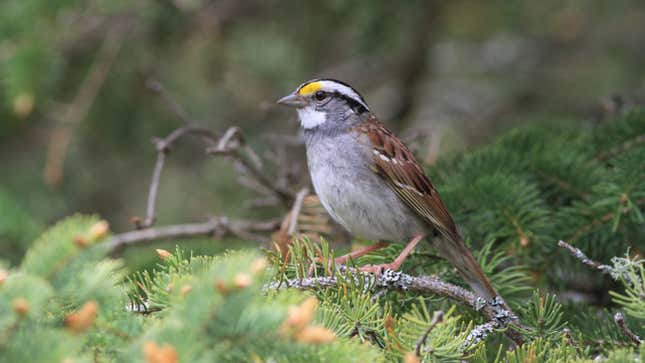
A new bird song is spreading like wildfire among Canadian white-throated sparrows, at a scale not seen before by scientists.
Birds rarely change their chirpy little tunes, and when they do, it’s typically limited to the local environment, where slight song variants basically become regional dialects. New research published today in Current Biology describes an extraordinary exception to this rule, in which a novel song sung by white-throated sparrows is spreading across Canada at an unprecedented rate. What’s more, the new song appears to be replacing the pre-existing melody, which dates as far back as the 1960s.
Birds sing to mark their territories and attract prospective mates. Traditionally, white-throated sparrows in western and central Canada sing a song distinguished by its three-note ending. The new song, which likely started off as a regional dialect at some point between 1960 and 2000, features a distinctive two-note ending, and it’s taking the sparrow community by storm. What makes the new ending so viral is a mystery to the study authors, led by Ken Otter from the University of Northern British Columbia.
“These songs are learned—otherwise new variants would not arise or spread,” Otter told Gizmodo. “Where it started could have been a single bird, but it then gets learned by others, and they would form tutors for other birds. It wouldn’t spread from a single bird.”
The new song, which can now be heard from British Columbia through to central Ontario—a distance of over 1,900 miles (3,000 km)—spread between 2000 and 2019, according to the research. The old melody, with its highly musical triplet outro, is now at risk of going extinct.
The contributions of citizen scientists were integral to the research. Field recordings of white-throated sparrows were uploaded to an online database called eBird, allowing Otter and his colleagues to track the spread of the new doublet over time and space.
“Citizen scientists played a key role, as the songs they recorded and made available expanded the spatial scope of the study. We never would have been able to cover this kind of distance if it was just us collecting songs,” said Otter. “The song libraries have massively expanded in the last five years, with eBird allowing people to upload recordings, not just observations.”
Results showed that the song likely originated west of the Rocky Mountains, where it’s been a smash hit for years, and has been steadily and quickly spreading east. By 2014, every white-throated sparrow in Alberta was singing the new doublet, with sizable bird populations in Ontario also chirping the happy tune.
Sparrow wintering grounds seem to be a key factor in explaining how the new tune has spread so quickly over such a large geographical area. Juvenile males arrive at their overwintering areas and mingle with sparrows from different parts of the country. Here, the impressionable young birds pick up the new melody and bring it back to their mating grounds, where it’s picked up by other sparrows. To say the new melody is going viral is a fairly accurate assessment.
To test this theory—that western and eastern sparrows share wintering grounds—Otter’s team attached geolocators to wild sparrows. Their results showed this is very much the case. Otter said a similar trend is happening among white-throated sparrows in the United States, “but most of their breeding range is in Canada’s boreal forest,” he said.
Why the new bird song is so compelling remains an unanswered question. It doesn’t seem to be giving the male birds a territorial advantage over their cohorts, so it could be that females are drawn to songs that aren’t familiar to them. But, as Otter pointed out, variants can’t be too unfamiliar.
“It looks like these sparrows may prefer to adopt slightly novel song variants rather than the common song. However, it does seem to have to match some kind of template, as you occasionally encounter males singing variants that aren’t doublets or triplets, but these other variants don’t seem to catch on,” Otter told Gizmodo. “So there must be some constraints as to what they will accept.”
Indeed, it seems the sparrows are already getting tired of the new song. According to Otter, it’s recently getting replaced by a new variant in Prince George, British Columbia, where the doublet is suspected of originating. It has been in this area for over 20 years, “so birds may not consider it novel anymore,” which explains “why a new song type is emerging.”
The researchers are hoping to study these bird songs further to see if female sparrows are truly responding to novel tunes, in a process that appears to be demanding ongoing musical innovations among these remarkable birds.